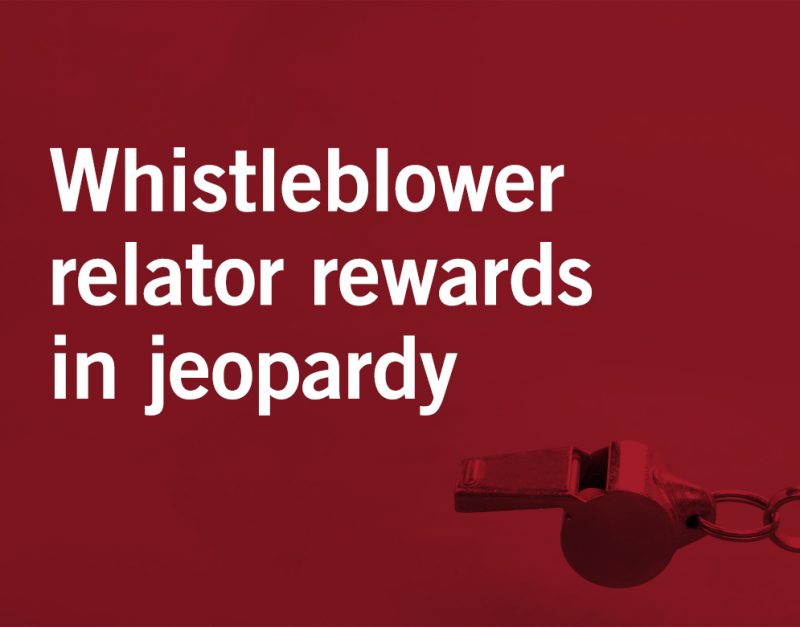 July 13, 2017
July 13, 2017 Financial CHOICE Act 2.0 Acts to Scare Off Potential Whistleblowers by Withholding Whistleblower Relator Rewards from Anyone Involved in the Fraud
The Financial CHOICE Act 2.0 could severely reduce the amount of tips the government receives about misuse of government programs and contracts. While the False Claims Act (“FCA”), under the qui tam provision, creates financial incentives for whistleblowers to provide information to the Securities and Exchange Commission (“SEC”) about companies who are defrauding governmental programs, the Financial CHOICE Act 2.0 places limits on eligibility to receive whistleblower relator rewards.
Under the proposed Financial CHOICE Act 2.0, in order for a whistleblower to collect rewards under the qui tam provision, the whistleblower must have tried to stop the fraud from occurring in their company. This would force potential whistleblowers to make a tough choice – raise the issue internally, where backlash such as being fired is a real possibility, or choose not to report the fraud at all. Raising the issue internally can create additional risks when people higher-up in the company are involved in the fraud, and will thus get an early notice of who the whistleblower is and what information they have. For this reason, it is important to have strong legislative protection for whistleblowers from retaliation, as well as competent representation by qui tam attorneys.
The whistleblower relator rewards are also vital because, for a variety of reasons, the whistleblower may have been involved in the fraud they are reporting. This may make them hesitant to bring information of the fraud forward. The whistleblower may have been directed by their employer to participate in the fraud, or they may have been unknowingly involved in what was later discovered to be fraud. This involvement is frequently how the whistleblower learns of the fraud in the first place. Because of this involvement in the fraud, the whistleblower may be hesitant to raise the issue, hence the need for the financial incentive that the Financial CHOICE Act 2.0 may serve to withhold.
What is Qui Tam?
Qui tam, in regard to the FCA, is a provision that allows relators (people unaffiliated with the government) to file claims on the government’s behalf for fraud. The qui tam provision in the FCA allows relators to collect whistleblower relator rewards based on a percentage of damages the government recovers against the accused company.
“Whistleblower” generally refers to the employee of the accused company who provides the SEC with information regarding the fraud. This person has “blown the whistle” on the fraud, alerting the SEC to what has happened and allowing the government to collect damages from the company that defrauded its programs.
Why are Whistleblowers Important?
When companies defraud the government, taxpayers bear the burden. Qui tam provisions allow whistleblowers to protect the government against fraud, saving taxpayers millions. Whistleblowers alert the SEC to the issue, which allows the government to recover damages from companies that have defrauded governmental programs. Additionally, the threat of whistleblowers coming forward potentially discourages other companies from attempting fraud.
Risks Whistleblowers Face
Whistleblower relator rewards were created to incentivize employees to speak out against fraud, even in the face of risks. When companies discover that someone within the organization is “blowing the whistle,” there is potential for backlash. Whistleblowers could be threatened, fired, or even blacklisted from getting jobs in the future. However, the FCA provides protection for whistleblowers, allowing a cause of action for whistleblowers to receive damages and qui tam attorney’s fees from any company that retaliates against an employee who reports fraud to the SEC, or raises the issue internally.
Contact Waters Kraus Paul & Siegel to Report Dodd-Frank Violations and SEC Fraud
Waters Kraus Paul & Siegel is a mid-sized plaintiff’s firm with experience in representing whistleblowers in qui tam cases. The qui tam attorneys of Waters Kraus Paul & Siegel will aggressively pursue your case to ensure that the companies engaged in defrauding the government are held responsible, and that you receive the whistleblower relator reward that you are entitled to. If you have information that your employer is defrauding the government, email us or call our qui tam attorneys at 800.226.9880.


